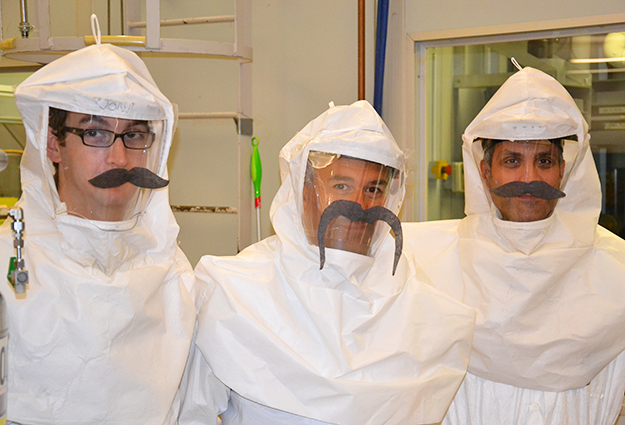Reactor staff motivated by ‘100 Dads Per Day’ during Movember

McMaster Nuclear Reactor staffers Jon Gear, George Bijelic and Stan Spina (left to right) get in the spirit of Movember. The facility's fundraising team is known as the 'Critical Mass-taches.'
Chris Heysel is a first-time participant in a Movember campaign.
He’s contributed to fundraising drives in the past, but never volunteered his time (and his upper lip) as a moustachioed member of a campus team.
It’s a good fit for the director of the University’s Nuclear Operations & Facilities, in more ways than one. Each day, Heysel and his colleagues at the McMaster Nuclear Reactor (MNR) are helping to stem the global tide of prostate cancer right here on campus.
“The MNR is a world leader in the production of iodine-125,” explained Heysel. “It’s a powerful yet controllable radioisotope used in the treatment of various cancers, predominantly prostate cancer. It was only a matter of time before our staff got involved in a Movember campaign.”
Each November, male participants in a Movember campaign grow moustaches to raise awareness and help generate funding for men’s health causes, including prostate cancer.
The reactor’s yield of iodine-125 is used to treat more than 100 men around the globe each day the reactor is in operation, explained Heysel. It’s a motivating statistic, and one that reactor staff are extremely proud of. Their Movember campaign has even been dubbed “100 Dads Per Day” by MNR staff.
The important radioisotope is routinely shipped from McMaster to various processing facilities, and then on to cancer treatment centres in Canada, the United States, Europe, Asia and South America. Once delivered to a treatment centre, the iodine-125 is encapsulated in durable titanium “seeds,” which are then implanted around a tumour. Over time, this strong but short-range dose of radiation helps diminish the tumour, and the seeds are extracted.
Known around campus as the “Critical Mass-taches,” the MNR Movember team includes John Avelar, Dave Tucker, Brad Trushinski, John Forbes, Chris Malcolmson, Duane Lambert, Brandon Johnston, Jacques Gauthier, Barry Diacon, Jon Gear, Frank Labonte and Heysel. More participants are expected to join in the weeks ahead.
“The Movember campaign does an excellent job of raising awareness, and they’re very good at engaging with people in a fun and lighthearted manner,” said Heysel. “Until a few years ago, prostate cancer wasn’t openly discussed, either.”
More than 25 teams and dozens of individuals are contributing to McMaster’s overall Movember network, including the Critical Mass-taches. Together, these teams and individuals hope to break last year’s campus fundraising effort of $75,877. If this happens, MNR will donate an additional $10,000 to the University’s total funds raised.
To date, roughly 455 participants are signed-on to the University’s “McMo’sters” network, and that number is still climbing.
Should McMaster emerge as the top fundraising campus in Canada, homegrown astronaut, social media celebrity and moustache aficionado Chris Hadfield will pay a visit to campus.
Lucas Canzona, assistant director of the McMaster Students Union’s Campus Events department, referred to the University’s Movember campaign as one of the most crucial annual events on campus.
“This campaign is of paramount importance,” explained Canzona. “Major issues involving men’s health are so often overlooked in the public eye. It’s important to keep a dialogue going, and it’s so easy for members of the McMaster community to make a difference.”
In July, McMaster researcher Khalid Al-Nedawi received a $194,000 Movember Discovery Grant to help further his research involving a biomarker for diagnosing prostate cancer.
For decades, the standard biomarker for diagnosis has been a prostate specific antigen (PSA). Recent studies have confirmed, however, that PSA can’t distinguish between benign and life-threatening tumours. This ultimately leads to a large number of unnecessary biopsies and the over-treatment of low-risk patients.
Al-Nedawi wants to change all of this.
“This grant money is really important. We’re ultimately looking for something better, in terms of a diagnostic process,” said Al-Nedawi, a researcher in McMaster’s Department of Medicine. “It will help us to explore and evaluate new biomarkers, and perhaps lead to a very simple test for large populations.”
The Movember movement was founded in Melbourne, Australia in 2003, and initially included 30 participants. The following year, more than 450 “Mo Bros” raised $54,000 for the Prostate Cancer Foundation of Australia.
By 2007, the movement was global.
Last year’s campaign involved more than 1.1. million participants in 21 countries, and resulted in $146.6 million (CAD) raised to benefit men’s health causes, including prostate cancer, testicular cancer and male mental health initiatives.
Can’t grow a cookie duster? There are plenty of ways for “Mo Sistas” and other participants to get involved, including hosting events, spreading the word on social media, advocating for men’s health or simply helping to raise funds.
Click here to make a donation to this year’s McMaster campaign.

